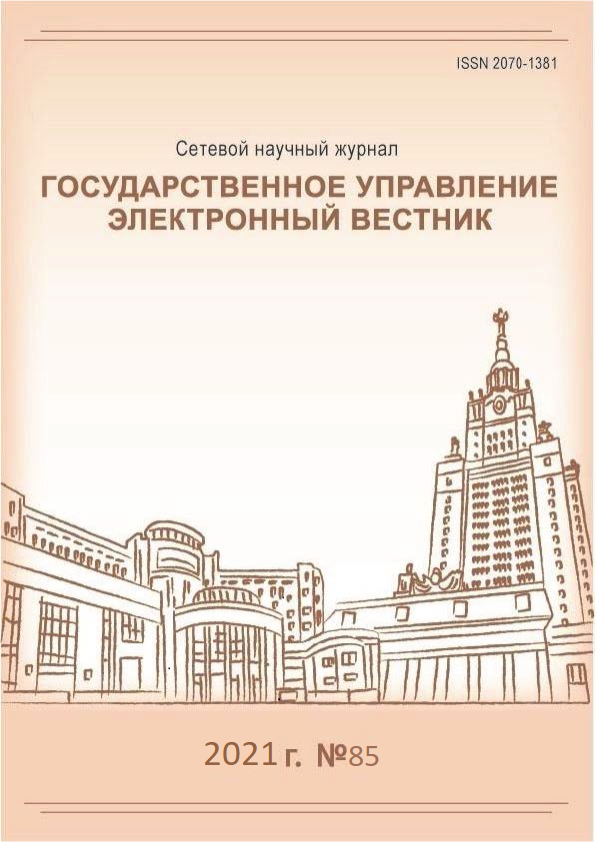Venture Capital and Creative Labour: Dilemma of Economic Growth Model Selection
Keywords:
Venture capital, reproduction, economic growth, industrial growth, venture capital marke, technological structureAbstract
The research is devoted to the choice of economic growth model in relation to the conditions of the Russian economy. The article analyses scientific research on economic growth to identify the specifics of the development of the domestic economy; indicates the parametric characteristics of comparing the liberal and socially oriented models; determines the degree of venture capital influence in the context of changing technological orders, as well as their causes and consequences. The authors note a special role of small innovative firms in stimulating economic development. Moreover, the most significant factors determining the circulation of venture capital in the reproduction process have been investigated. The main advantages of venture capital, which provide the opportunity for high-risk innovative business, the possibility of stage-by-stage development, have been determined. The dynamics of the venture capital market development on a global scale is analyzed, the features of the venture capital market in the United States, as well as the state and prospects of the venture capital development in the Russian Federation, including in the context of the global COVID-19 pandemic, are investigated. As a result, the main trends in the venture capital market development in Russia have been determined and a significant structural deficit of venture capital investments in Russia revealed. The necessity of systematizing state support of the venture capital market by management levels (from nano to global) and structuring within each level from the point of view of the significance and degree of generalization, the focus on the formation of motivational mechanisms for the transition to innovative-expanded reproduction has been substantiated. As a conclusion, a number of legislative measures are proposed to stimulate the development of venture capital in Russia. It has been proved that Russia’s transition to an innovative type of economic development presupposes the formation of new innovation-structural-reproduction relations based on a combination of state and market regulators.
References
Кейнс Дж.М. Общая теория занятости, процента и денег // Антология экономической классики: В 2 т. М.: Эконов, 1992.
Мальтус Т. Опыт о законе народонаселения. М.: К.Т. Солдатенков, 1895.
Маркс К. Капитал. Т. 2 // К. Маркс, Ф. Энгельс. Полное собрание сочинений. 2-е изд. Т. 24. М.: Издательство политической литературы, 1960.
Милль Дж.С. Основы политической экономии и некоторые аспекты их приложения к социальной философии. М.: Прогресс, 1980.
Нуреев Р.М. Теории развития: новые модели экономического роста (вклад человеческого капитала) // Вопросы экономики. 2000. № 9. С. 136–157.
Петти В. Экономические и статистические работы. Т. I–II. М.: Соцэкгиз, 1940.
Пороховский А.А. Политическая экономия современного кризиса // Главная книга о кризисе: сборник статей / под ред. А.В. Бузгалина М.: Яуза: Эксмо, 2009. С. 47–58.
Рикардо Д. Начала политической экономии и налогового обложения. М.: Эконов, 1991.
Смит А. Исследование о природе и причинах богатства народов. М.: ЭКСМО, 2007.
Современные классики теории предпринимательства. Лауреаты Международной премии за вклад в исследования предпринимательства и малого бизнеса (1996–2010) / пер. с англ. под науч. ред. А.Ю. Чепуренко. М.: Изд. дом Высшей школы экономики, 2013.
Фельдман Г.А. К теории темпов народного дохода // Плановое хозяйство. 1928. № 11. С. 146–170.
Шумпетер Й.А. Теория экономического развития. М: Директмедиа Паблишинг, 2008
Arrow Kenneth J. The Economic Implications of Learning by Doing // The Review of Economic Studies. 1962. Vol. 29. Is. 3. P. 155–173. DOI: https://doi.org/10.2307/2295952.
Birch D. Sources of Job Growth and Some Implications // Jobs, Earnings, and Employment Growth Policies in the United States / ed. by J. Kasarda. Dordrecht: Springer, 1990. P. 71–76.
Domar E. Capital Expansion, Rate of Growth, and Employment // Econometrica. 1946. Vol. 14. No. 2. P. 137–147. DOI: https://doi.org/10.2307/1905364.
Harrod R.F. An Essay in Dynamic Theory // Economic Journal. 1939. Vol. 49. No. 193. P. 14–33.
Kuznets S. National Income, 1929–1933 // NBER Working Paper. 1934. No. 49. URL: https://www.nber.org/system/files/chapters/c2258/c2258.pdf
Scherer F. Changing Perspectives on the Firm Size Problem // Innovation and Technological Change / ed. by Z. Acs, D. Audretsch. Ann Arbor: University of Michican Press, 1991. P. 24–28.
Solow R.M. A Contribution to the Theory of Economic Growth // Quarterly Journal of Economics. 1956. Vol. 70. No. 1. P. 65–94.
Swan T. Economic Growth and Capital Accumulation // The Economic Record. 1956. No. 2. P. 334–361. DOI: https://doi.org/10.1111/j.1475-4932.1956.tb00434.x.
Wetzel W. The Informal Venture Capital Market: Aspects of Scale and Market Efficiency // Journal of Business Venturing. 1987. Vol. 2. Is. 4. P. 299–314. DOI: https://doi.org/10.1016/0883-9026(87)90023-1.

